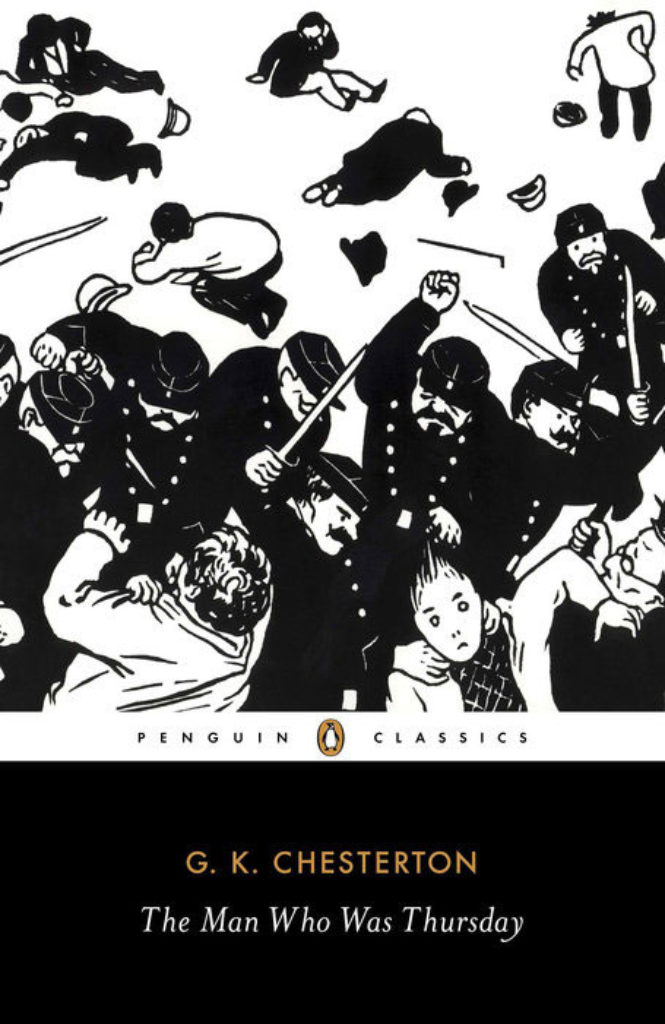The Man Who Was Thursday by G.K. Chesterton is a stand-alone novel. What happens when a good man poses as the enemy to shield the world from bomb-throwing anarchists?

The Man Who Was Thursday by G.K. Chesterton is a stand-alone novel. What happens when a good man poses as the enemy to shield the world from bomb-throwing anarchists?
Gabriel Syme is an idealist. During a chance discussion with a policeman, he learns Scotland Yard is more concerned about the subversive plots of intellectuals than the crimes of common thieves and murders. The policeman convinces Syme to join the force and infiltrate a group of anarchists.
Syme, posing as a poet, meets and verbally spars with an anarchist named Lucien Gregory at a party. Gregory claims revolt is the essence of poetry, and Syme argues Gregory is just a blowhard. Gregory says if Symes will promise to keep a secret, he’ll take him to see something amazing.
Syme promises, and Gregory takes him to a secret meeting of his chapter of the anarchists’ council. Gregory explains that the central council comprises seven leaders, each with a code name corresponding with a day of the week. The position of Thursday is open, and Gregory expects to be voted into the role that night.
Syme asks Gregory to promise to keep a secret too, and Syme reveals he is a police officer. With this new information, Gregory’s public remarks about why he should be elected are tame. Syme pretends to be dismayed by Gregory’s weakness and places himself as a contender for Thursday. He wins and is sent to meet with the rest of the high council in London.
Syme finds each council member intimidating, but none more so than the giant-bodied Sunday. When the members disperse, Syme realizes one of the councilmen is following him. He catches the man, who admits he is also a police detective. Similar cat-and-mouse scenarios take place as the story progresses until it is clear each of the council members, except for Sunday, is actually a police officer.
The officers band together to capture Sunday. Sunday evades his pursuers on an elephant’s back and in a hot air balloon before he leads them to his house. He gives each man a costume that symbolizes the day of Creation after which he is named.
Each man, along with Sunday, is then made to sit upon a throne. Sunday tells them he is the Sabbath and the peace of God, revealing he has never been their enemy. Gregory shows up and begins railing against the men’s power. He wonders angrily why they have never had to suffer like he has. In response, Sunday quotes Mark 10:38 (KJV), “Can ye drink of the cup I drink of?”
Syme is abruptly returned to reality. He doesn’t remember sleeping but realizes this was all a dream. He wakes up finding himself happy and talking pleasantly with Gregory.
Several biblical allusions, such as likening the councilmen to the days of Creation, and Bible verses, including Mark 10:38, appear. Some critics and readers suggest there is additional biblical symbolism based on Chesterton’s beliefs, but there are few overt references to Christianity.
None
Sunday leads the police officers through strange and circuitous exercises before revealing he isn’t an anarchist. He tells the men he is the Sabbath and the peace of God.
Law enforcement officers theorize that people with money, power and intellect are more dangerous than poor, common criminals. They believe the poor simply break laws to improve their present, earthly circumstances; intellectuals desire to annihilate the institutions and constructs on which society is built.
The Lord’s name is used in vain. A– and d–n also appear a number of times.
None
Get free discussion questions for this book and others, at FocusOnTheFamily.com/discuss-books.
You can request a review of a title you can’t find at [email protected].
Book reviews cover the content, themes and worldviews of fiction books, not their literary merit, and equip parents to decide whether a book is appropriate for their children. The inclusion of a book’s review does not constitute an endorsement by Focus on the Family.